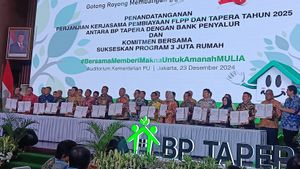YOGYAKARTA - Activists from various backgrounds formed the Guard the Election movement to oversee the implementation of the 2024 Election. This movement was launched to monitor indications of abuse of power in the interests of winning the election. So what is abuse of power that is often discussed lately?
Abuse of power is a term used for acts of abuse of power or authority by certain people. Not infrequently this action is found within the government sphere and is carried out by people in high positions. This fraudulent behavior also often occurs in the work or professional world.
Abuse of power is carried out to gain unfair advantage for oneself, one's family or one's group. To anticipate these bad actions, you need to understand what abuse of power is and its characteristics.
What is Abuse of Power?
Abuse of power is an act of abusing power or authority for certain interests. This action is vulnerable to being carried out by people or groups who have higher power. Abuse of power can occur in countries, companies and organizations.
In the book Joints of Constitutional Law written by Dr. Hotma P. Sibuea and Dr. Hj. Asmak ul Hasnah, abuse of power is explained as an act of abusing power or authority to achieve certain interests and can result in harm to other people.
People who carry out abuse of power use their power or authority to oppress or dominate other people who are in a lower position. This action is a disgraceful act and violates the law. Based on Article 3 of Law (UU) Number 31 of 1999, every person who abuses power and harms the state will be sentenced to life imprisonment or a minimum of one year.
Abuse of Power Characteristics
The following are the characteristics of abuse of power or abuse of power that you need to understand:
Deviating from the Purpose or Purpose of Granting Authority
The authority or power given to officials must be used in accordance with the aims and objectives, which are useful for the public interest. If this power is used for personal or group interests and to the detriment of other people, then this action constitutes an act of abuse of power.
Deviating from the Goal or Intent in Relation to the Principle of Legality
The principle of legality is a basic legal principle which regulates that every action must be based on applicable laws and regulations. Therefore, activities of officials or people in positions that violate the law include abuse of power.
Saving from the Goal or Intent in Relation to General Principles
The general principles referred to in this case are the principle of legal certainty, the principle of orderly state administration, the principle of public interest, the principle of openness, the principle of professionalism, the principle of accountability, and so on.
Example of Abuse of Power
Some examples of abuse of power that are commonly found in everyday life or the state, namely corruption, bribery, threats or insults to subordinates, and so on.
Apart from that, the following are forms of abuse of power that may be encountered in government, companies or organizations:
- Putting his own personal or group interests first and ignoring the interests of the company, institution or organization he leads.
- Forcing or demanding that other people follow the rules even though they themselves do not follow them.
- Threatening subordinates who do not work according to their wishes or wishes.
- Treating subordinates badly because of trivial matters or something personal.
- Committing acts of sexual harassment to employees or subordinates.
VOIR éGALEMENT:
That's a review of what abuse of power is and the characteristics that need to be understood. Abuse of power does not only refer to government officials or officials who have legal authority, but can also occur in positions in companies or organizations.
Keep following the latest domestic and foreign news on VOI. We present the latest and most updated news, both national and international.
The English, Chinese, Japanese, Arabic, and French versions are automatically generated by the AI. So there may still be inaccuracies in translating, please always see Indonesian as our main language. (system supported by DigitalSiber.id)













